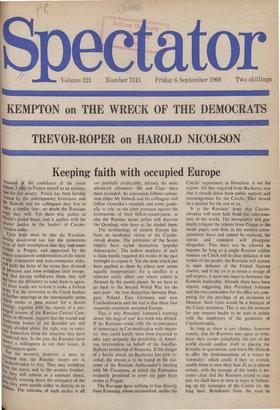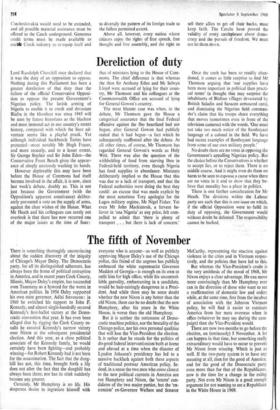Keeping faith with occupied Europe
Assured of the confidence of the entire nation. I offer to France myself as an attenua- tion for her misery.' Petain has been harshly treated by the contemporary historians, and 4r Dubcek and his colleagues may live to ttfler a similar fate :, no doubt the Russians hope they will. Yet there was justice in retain's proud boast, and it applies with far greater justice to the leaders of Czecho- qovakia today. is Their hope must be that the Russians, "aving discovered too late the monstrous : of their assumption that they had some r'ends in Prague, and impressed by the fl'i44 illgst unanimous condemnation of the whole vc.)rld, communist and non-communist alike, Mil fulfil the letter of the terms they dictated Moscow, and soon withdraw their troops: 4110 that having withdrawn them, they will not have the effrontery to send them in again. As these words are written it looks a forlorn hope. Yet the invitation to the Czech leaders , 14 further meetings in the interminable series siWllieh seems to pass muster for a Soviet ir4tegY, together with the reports of a pro- 1,1$ed session of the Russian Central Com- ratee in Moscow, suggest that the scared and coherent bosses of the Kremlin are still deeply divided about the right way to extri- 1,4,te themselves from the situation they have `4',41ridered into. In the past the Russians have (,"°wn a willingness to cut their losses. It `1141d happen again. iijOr the moment, however, it must be too painfully predictable. Already the more advanced reformers—Sik and Cisar—have been excluded. As concession follows conces- sion either Mr Dubcek and his colleagues will follow Gomulka's example and come gradu- ally to rely on the alien presence against the frustrations of their fellow-countrymen; or else the Russian secret police will discover the Quislings who have so far eluded them.
The terminology of eastern Europe has been an incidental victim of the Czecho- slovak drama. The territories of the Soviet empire have styled themselves `popular democracies.' The hollow mockery of such a claim hardly required the events of the past fortnight to expose it. Yet the term which has been applied to them by others now seems equally inappropriate: for a satellite is a separate entity albeit one whose course is, dictated by the parent planet. So we have to go back to the Second World War for the nun frisk,: the true distinction between Hun- gary, Poland, East Germany and now Czechoslovakia and the rest is that these four countries constitute occupied Europe.
That is why President Johnson's warning about 'the dogs of war' last week was absurd. If the Russians could stifle the re-emergence of democracy in Czechoslovakia with impun- ity, they could hardly have been expected to take very seriously the possibility of Ameri- can intervention on behalf of the Gaullist- Stalinist leadership of Rumania. If the danger of a Soviet attack on Bucharest has now re- ceded, the reason is to be found in the out- come of the Russian Ambassador's meeting with Mr Ceausescu, at which the Rumanian evidently promised to avert his gaze from events in Prague. The 1R.ussiaas have nothing to fear directly from Rumania, whose nationalism, unlike the Czechs' experiment in liberalism, is not fOr export. All, they required-from Bucharest was that it should desist from public support and encouragement for the Czechs. That should be a pointer for the rest of us.
It is the Russians' hope that Czecho- slovakia will soon fade from the conscious- ness of the world. The newspapers will gra- dually relegate the reports from Prague to the- inside pages, and then, as the western corre- spondents leave and cannot be replaced, the stories and comment will disappear altogether. This must not be allowed to. happen. So long as a single Russian soldier remains on Czech soil in clear defiance of the wishes of the people, the Russians will remain in open defiance of the United Nations charter, and if the UN is to retain a vestige of self-respect, it must not cease to denounce the Kremlin leadership. Already there have been reports suggesting that President Johnson and the two contenders for his office are com- peting for the privilege of an invitation to Moscow. Such visits would be a betrayal of the Czech resistance. This is not the moment for any western leader to be seen in public with the employers of the gauleiters of Czechoslovakia.
So long as there is any chance, however remote, that the Russians may agree to with- draw their troops completely the rest of the world should confine itself to placing the Kremlin in quarantine, and leave Mr Dubcek to offer the demonstrations of a return to `normality' which could, if they so wished, enable them to save their face. If, as is almost certain, with the passage of the weeks it be- comes clear that the Russians intend to stay put, we shall have to turn to ways of bolster- ing up the resistance of the Czechs for the long haul. Broadcasts from the west to Czechoslovakia would need to be extended, and all possible material assistance must be offered to the Czech underground. Generous credit terms must be made available to enable Czech industry to re-equip itself and to diversify the pattern of its foreign trade to the fullest permitted extent.
Above all, however, every nation whose citizens enjoy the rights of free speech, free thought and free assembly, and the right to tell their allies to get off their backs, must keep faith. The Czechs have proved the validity of every catehphrase about demo- cracy and the pursuit of freedom. We must not let them down.







































 Previous page
Previous page